Related Research Articles
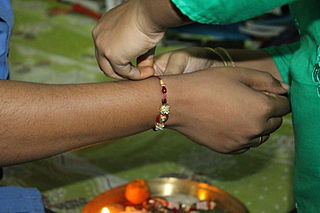
Raksha Bandhan is a popular and traditionally Hindu annual rite or ceremony that is central to a festival of the same name celebrated in South Asia. It is also celebrated in other parts of the world significantly influenced by Hindu culture. On this day, sisters of all ages tie a talisman or amulet called the rakhi around the wrists of their brothers. They symbolically protect them, receive a gift in return, and traditionally invest the brothers with a share of the responsibility of their potential care.
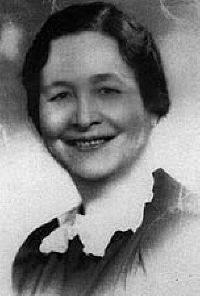
Ella Cara Deloria, also called Aŋpétu Wašté Wiŋ, was a Yankton Dakota (Sioux) educator, anthropologist, ethnographer, linguist, and novelist. She recorded Native American oral history and contributed to the study of Native American languages. According to Cotera (2008), Deloria was "a pre-eminent expert on Dakota/Lakota/Nakota cultural religious, and linguistic practices." In the 1940s, Deloria wrote a novel titled Waterlily, which was published in 1988, and republished in 2009.
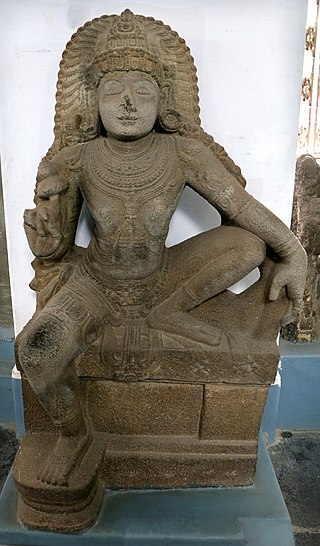
Ayyanar is a Tamil deity venerated in South India and Sri Lanka. His worship is prevalent among the Dravidian peoples. Some studies suggest that Ayyanar may have also been worshipped in Southeast Asian countries in the past. He is primarily worshipped as one of the guardian folk deities of Tamil Nadu. The temples of Ayyanar in the countryside are usually flanked by gigantic and colourful statues of him and his companions riding horses or elephants.

Komal Kothari (1929-2004) was an Indian folklorist and ethnomusicologist. Komal Kothari had devoted his life to investigation and documentation of folk traditions of western Rajasthan. Kothari received the honour of Padma Shri and Padma Bhushan from the Government of India. Komal Kothari painstakingly worked to preserve the cultural memory and made numerous recordings of folk music. He studied Langa and Manganiyar communities of folk musicians of Thar desert. Komal Kothari was not only a scholar but also a man of action. He co-founded Rupayan Sansthan - Rajasthan Institute of Folklore, in 1960 in the village of Borunda. The institution houses a repository of recordings by Kothari and works to collect, preserve, and disseminate the oral traditions of Rajasthan. Kothari was co-editor of the journal Lok Sanskriti, a journal based on the theme of folk culture. Besides, Kothari arranged international performances of folk artists from Rajasthan in several counries. His monograph on Langas, a folk-musician caste in Rajasthan, was enlivened by an accompanying album of recordings of twelve folk songs sung by Langa artistes. His understanding of desert culture and its connections with ecology endeared him to the environmentalists. He planned a museum based on the ecology of the broom’, to show the technical use of specific types of desert grass for specific purposes. His vision was actualised in the form of Arna Jharna - The Thar Desert Museum of Rajasthan in Borunda, near Jodhpur. Kothari was a scholar of patterns of culture and his expertise enriched both folklore studies and history.

Pandit Laxmi Ganesh Tewari is a Hindustani vocalist from India. He is an exponent of the Gwalior gharana (tradition) of vocal music. After studying with Lalmani Misra at Banaras Hindu University in Varanasi, he pursued education and teaching opportunities in America. At Sonoma State University since 1974, his career has combined performance, scholarship and teaching.
The Dhola Maru is the romantic tale of Dhola and Maru in Rajasthan. The Rajasthani version is entirely different from a version found in Chhattisgarh.
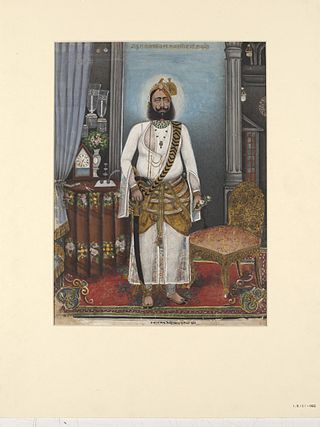
Thakur is a historical feudal title of the Indian subcontinent. It is also used as a surname in the present day. The female variant of the title is Thakurani or Thakurain, and is also used to describe the wife of a Thakur.
Charlotte Melina Viall Wiser (1892–1981), born Charlotte Melina Viall, was an American anthropologist, and a Presbyterian rural-missionary to North India – Uttar Pradesh.
William Henricks Wiser (28 January 1890 – 21 February 1961), also spelled as Hendricks, was an American anthropologist, and a Fourth Presbyterian Church, Chicago IL Presbyterian rural-missionary sent to North India - Uttar Pradesh.
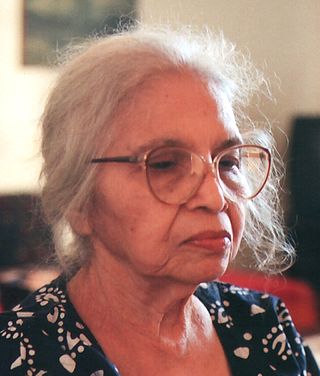
Leela Dube was a renowned anthropologist and feminist scholar, fondly called Leeladee by many. She had been married to the renowned anthropologist and sociologist LateShyama Charan Dube. Leela Dube was the younger sister of the late classical singer Sumati Mutatkar. Her elder son Late Mukul Dube was an avid photographer. She is survived by her younger son, Saurabh Dube. Known for her work on kinship and in women's studies, she wrote several books including Matriliny and Islam: religion and society in the Laccadives and Women and kinship: comparative perspectives on gender in South and South‑east Asia.
Dr. Brenda E.F. Beck, also known as Brindha Beck, is a Canadian anthropologist and exporter of Tamil culture. She has published eight books and authored over sixty journal articles and is a key figure in raising awareness of Tamil culture in Toronto, Canada, where many Tamil Indians settled after the Tamil Diaspora. She lived in Olapalayam near Kangayam for two years in the Indian state of Tamil Nadu. She spent two years there for her doctorate in anthropology, awarded by the University of Oxford. The title of the thesis was Social and conceptual order in Koṅku. She published her research in a book under the title of Peasant Society in Koňku.

Barahmasa is a poetic genre popular in the Indian subcontinent derived primarily from the Indian folk tradition. It is usually themed around a woman longing for her absent lover or husband, describing her own emotional state against the backdrop of passing seasonal and ritual events. The progression of months is a fundamental component of the genre, but the number of months is not necessarily barah or "twelve" as similar poetic forms known as chaumasas, chaymasas and ashtamasas also exist in the same lineage of folk traditions.
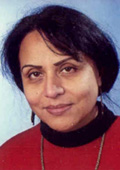
Aparna Rao was a German anthropologist who performed studies on social groups in Afghanistan, France, and some regions of India. Her doctorate studies focused on anthropogeography, ethnology, and Islamic studies. Rao taught anthropology at the University of Cologne, serving for a brief time as chair of the Department of Ethnology at the South Asia Institute of Heidelberg University, Germany.
Natalya Romanovna Guseva was a Russian ethnographer, historian, Indologist and writer.
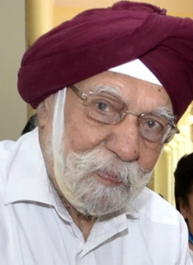
Indera Paul Singh was an Indian anthropologist who had served at prominent positions in several Indian and international anthropological organizations.
Gabriella Eichinger Ferro-Luzzi is an Italian anthropologist and dravidologist who has done field studies in India, mainly in the Tamil Nadu state.

Bhāt is a "generic term" used to refer to a bard in India. The majority of Bhats hail from Rajasthan and worked as genealogists for their patrons, however, they are viewed as mythographers. In India, the inception of Rajputization was followed by the emanation of two groups of bards with a group of them serving the society's influential communities and the other serving the communities with lower ranking in the social hierarchy.
Dirk Herbert Arnold Kolff is a Dutch historian and Indologist. Born at Rotterdam in the Netherlands, Kolff earned a doctorate degree from the Leiden University in 1983 with a doctoral thesis on the research subject of armed peasantry in northern India. He is a professor emeritus of modern South Asian history and the former Chair of Indian History at the Leiden University.
Harald Tambs-Lyche is a Norwegian ethnologist and social anthropologist.
References
- 1 2 Wadley, Susan Snow (1943–....) (in French). Retrieved 25 September 2020– via Bibliothèque nationale de France.
- 1 2 3 4 "Maxwell's Susan Wadley honored by Open Hand Theater". Syracuse University. New York, USA. Retrieved 1 October 2020.
- ↑ "Susan S. Wadley | AMESA". Columbia University . New York, USA. Retrieved 25 September 2020.
- 1 2 Murphy, Anne (2017) [First published 2016]. "Uses of the Folk: Cultural Historical Practice and the Guga Tradition". In Nayar, Rana; Syal, Pushpinder; Kumar, Akshaya (eds.). Cultural Studies in India. New York, USA; Oxfordshire, UK: Routledge. p. 197. ISBN 978-1351570374. OCLC 994231061.
- 1 2 Wadley, Susan S. (2001). "Hindu Women's Family and Household Rites in a North Indian Village". In Falk, Nancy Auer; Gross, Rita M. (eds.). Unspoken Worlds: Women's Religious Lives. Philosophy (3rd, illustrated ed.). Belmont, California, USA: Wadsworth/Thomson Learning. Editors' Footnote. ISBN 978-0534515706. LCCN 00033410. OCLC 924720058. p. 103:
Susan S. Wadley, Ford Maxwell Professor of South Asian Studies and Professor of Anthropology at Syracuse University, received her Ph.D. in Anthropology from the University of Chicago in 1973. Her research interests range from women's ritual and folklore to regional epic traditions to socioeconomic change, especially as it affects women in rural north India.
- ↑ Marriott, McKim, ed. (1990). "About the Contributors". India Through Hindu Categories. Contributions to Indian Sociology, Occasional Studies, No. 5 (illustrated ed.). New Delhi, India; Newbury Park, California, USA: SAGE. ISBN 978-8170361763. LCCN 90900874. OCLC 21907375. p. 204:
Her doctoral dissertation (at Chicago in 1973) is the book Shakti: power in the conceptual structure of Karimpur religion.
- ↑ Yü, Chün-fang (2020). The Renewal of Buddhism in China: Zhuhong and the Late Ming Synthesis. The Sheng Yen Series in Chinese Buddhist Studies. Daniel B. Stevenson. New York, USA: Columbia University Press. ISBN 978-0231552677. LCCN 2020012025. OCLC 1158503616.
Susan Snow Wadley collected and analyzed stories and songs of a North Indian village called Karimpur in Shakti: Power in the Conceptual Structure of Karimpur Religion.
- 1 2 3 4 "Susan Snow Wadley | Professor Emerita, Anthropology". Syracuse University. New York, USA. Retrieved 25 September 2020.
- 1 2 "Lecture: Susan Wadley, From Powerful Goddesses to Modern Women: Mithila's Artists Paint for the 21st Century". University of Tennessee . Knoxville, Tennessee, USA. Retrieved 25 September 2020.
- ↑ van Hollen, Cecilia (Spring 2011). "From the Director's Desk". South Asia Center Newsletter. New York, USA: South Asia Center, Moynihan Institution of Global Affairs, Maxwell School of Citizenship and Public Affairs, Syracuse University. p. 1. Retrieved 1 October 2020.
It has been a tremendous honor to begin my tenure as the new Director of the South Asia Center, following the many years of inspired and tireless leadership of my predecessors, Susan Wadley and Ann Gold.
- 1 2 "Awards and Recognition: Reunion 2015". Carleton College. Northfield, Minnesota, USA. Retrieved 25 September 2020.
- 1 2 Moffatt, Michael (March 1996). "Village and Personal Agency in South Asia (Reviewed Works: Struggling with Destiny in Karimpur 1925–1984 by Susan S. Wadley; Public Faces, Private Voices: Community and Individuality in South India by Mattison Mines)". American Anthropologist . New. Wiley. 98 (1): 172–174. doi:10.1525/aa.1996.98.1.02a00230. ISSN 0002-7294. JSTOR 682970.
- ↑ Wadley, Susan S. (2008). "In Search of the Hindu "Peasants'" Subjectivity". India Review. Taylor & Francis. 7 (4, Covering India). Notes. doi:10.1080/14736480802548053. S2CID 143931150.
- 1 2 Naithani, Sadhana (2009). Haase, Donald; Barchilon, Jacques; Duggan, Anne E.; Bacchilega, Cristina; et al. (eds.). "Reviewed Work: Raja Nal and the Goddess: The North Indian Epic Dhola in Performance by Susan Snow Wadley". Marvels & Tales. Detroit, USA: Wayne State University Press. 23 (2): 404–406. ISSN 1521-4281. JSTOR 41388935.
- 1 2 Shukla, Archana (January–December 2006). Channa, Subhadra; Mehrotra, Nilika; Singh, Manoj Kumar; Gaur, Mokshika (eds.). "Reviewed Work: Essays on North Indian Folk Traditions by Susan S. Wadley". Indian Anthropologist. India: Indian Anthropological Association. 36 (1/2, Special Issue on Folk Narratives): 164–167. ISSN 0970-0927. JSTOR 41920012.
- 1 2 3 Ferrari, Fabrizio M. (2006). "Reviewed Work: Essays in North Indian Folk Traditions by Susan S. Wadley". Bulletin of the School of Oriental and African Studies, University of London . Cambridge University Press. 69 (3): 481–483. doi:10.1017/S0041977X06340219. ISSN 0041-977X. JSTOR 20182090. S2CID 162319646.